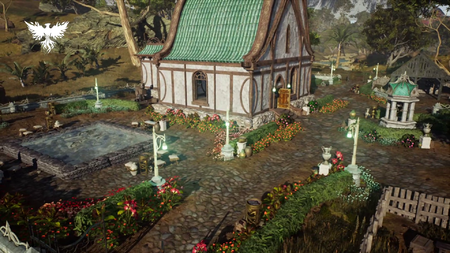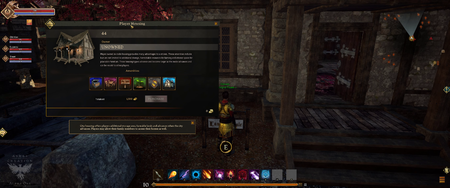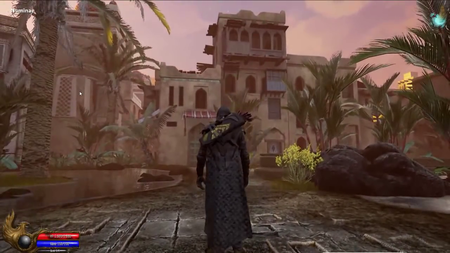Template:Static housing und Nodes: Unterschied zwischen den Seiten
Lex (Diskussion | Beiträge) (Fix template) |
Lex (Diskussion | Beiträge) (Add additional housing types) |
||
| Zeile 1: | Zeile 1: | ||
| − | + | {{Draft}} | |
| − | + | [[File:node_zoi.png|thumb|400px|Nodes are pre-set locations, wrapped in a [[Zone of influence|zone of influence]].<ref>[https://www.ashesofcreation.com/node-series-part-one/ Node series part I]]</ref>]] | |
| − | + | Encompassing each server are carefully placed points of development called Nodes. Every node is given purview over a predefined [[zone of influence]] (ZOI).<ref name="nodes">[https://www.ashesofcreation.com/a-reactive-world-nodes/ A reactive world - Nodes]</ref> | |
| − | + | == Node advancement == | |
| − | |||
| − | |||
| − | |||
| − | |||
| − | |||
| − | + | [[File:NodeEvolution.mp4|thumb|400px|Illustration of node advancement from [[Expedition]] (stage 1) to [[Metropolis]] (stage 6).]] | |
| − | + | Player activity (questing, gathering, raiding, etc.) within a Node's ZOI counts toward that particular Node’s advancement. There are six stages of node advancement.<ref name="nodes"/> | |
| − | * | + | # [[Expedition]] (Few hours) |
| + | # [[Encampment]] (Many hours) | ||
| + | # [[Village]] (Few days) | ||
| + | # [[Town]] (Many days) | ||
| + | # [[City]] (Few weeks) | ||
| + | # [[Metropolis]] (Many weeks) | ||
| + | |||
| + | The advancement of a node unlocks its unique content, which comes at the cost of locking out an increasing ring of neighboring nodes from progressing to the next stage.<ref>[https://youtu.be/44HChA1Kkfk Ashes of Creation - Nodes part 2]</ref> | ||
| + | |||
| + | == Node development == | ||
| + | |||
| + | Nodes have a base style template based on [[Races|race]] and the [[Node types|Node type]].<ref name="development">[[File:node development.png|350px]]</ref> The [[#Node government|node's government]] will decide the types of buildings to be constructed.<ref>[https://youtu.be/GQvDMQXWTp0?t=2036 Ashes of Creation livestream Q&A, 19 May 2017 (33:56)]</ref> | ||
| + | |||
| + | * Apartment complexes | ||
| + | * Merchant housing | ||
| + | * Guild halls | ||
| + | * Marketplaces | ||
| + | * Barracks | ||
| + | |||
| + | When the building types are determined, the community will then need to come together to build them. Different governments may change the buildings within a node.<ref name="development"/> | ||
| + | |||
| + | == Node government == | ||
| + | |||
| + | A node's government and its mayor are chosen depending on the [[Node types|Node type]].<ref>[[File:node types.png|350px]]</ref> | ||
| + | |||
| + | * [[Divine node]] governments are chosen from citizens via service oriented quests that prove faith and dedication to the node. | ||
| + | * [[Economic node]] governments are able to be bought and sold by citizens with the most money. | ||
| + | * [[Military node]] governments are chosen from citizens through last man standing combat. | ||
| + | * [[Scientific node]] governments are elected democratically. | ||
| + | |||
| + | Guilds do not control nodes.<ref>[[File:node not guild.png|350px]]</ref> | ||
| + | |||
| + | == Node housing == | ||
| + | |||
| + | {{Node housing|1====}} | ||
| + | |||
| + | == Node apartments == | ||
| + | |||
| + | {{Apartments|1====}} | ||
| + | |||
| + | == Freeholds == | ||
| + | |||
| + | {{Freeholds|1====}} | ||
| + | |||
| + | {{Notes}} | ||
Version vom 13. Oktober 2017, 17:58 Uhr
Encompassing each server are carefully placed points of development called Nodes. Every node is given purview over a predefined Einflussbereich (ZOI).[2]
Entwicklung der Node
Player activity (questing, gathering, raiding, etc.) within a Node's ZOI counts toward that particular Node’s advancement. There are six stages of node advancement.[2]
- Expedition (Few hours)
- Feldlager (Many hours)
- Dorf (Few days)
- Stadt (Many days)
- Großstadt (Few weeks)
- Metropole (Many weeks)
The advancement of a node unlocks its unique content, which comes at the cost of locking out an increasing ring of neighboring nodes from progressing to the next stage.[3]
Entwicklung von Knotenpunkten
Nodes have a base style template based on race and the Node type.[4] The node's government will decide the types of buildings to be constructed.[5]
- Apartment complexes
- Merchant housing
- Guild halls
- Marketplaces
- Barracks
When the building types are determined, the community will then need to come together to build them. Different governments may change the buildings within a node.[4]
Knotenpunkt-Regierung
A node's government and its mayor are chosen depending on the Node type.[6]
- Divine node governments are chosen from citizens via service oriented quests that prove faith and dedication to the node.
- Economic node governments are able to be bought and sold by citizens with the most money.
- Military node governments are chosen from citizens through last man standing combat.
- Scientific node governments are elected democratically.
Guilds do not control nodes.[7]
Node-Häuser
Statische Behausungen provides non-instanced player accommodation within a node, also known as in-node housing.[9]
- Players are able to purchase small one room houses (cottages) starting at the Dorf (Stufe 3).[9][10]
- There will be 8 cottages available for purchase at the village stage.[10]
- The amount of static housing increases as a normal part of node advancement.[11]
- The architecture of static housing is predetermined by the racial influence of the node's layout and style.[12]
- Tavernen and Player shops are not tied to in-node housing.[13]
Node apartments
Apartments sind (instanzierte) Wohnungen in Gebäuden innerhalb einer Node, die eine Housing-Funktion bieten.[9] Es werden zu Beginn 50 Apartments zum Verkauf stehen, sobald eine Node sich zu einem Dorf (Stufe 3) entwickelt. Weitere Apartment-Gebäude können in einer Stadt (Stufe 4) gebaut werden, wenn der/die Bürgermeister/in sich entscheidet diese auf einem verfügbaren Baugebiet zu errichten.[10][11]
- Die Anzahl der verfügbaren Apartments erhöht sich automatisch während der Node-Weiterentwicklung.[11]
- Zu einem früheren Zeitpunkt wurde bekannt gegeben, dass Apartments erst ab der Stufe Stadt (Stufe 4) oder höher verfügbar wären .[9]
The mayor may additionally construct apartment buildings when the node hits stage 4 at one of the building plots in the node, along with cities gaining additional static housing and apartments by default as a normal part of the leveling process.[11] – Steven Sharif
Grundbesitz

Three main purposes that freeholds provide are allowing players an opportunity to express themselves in a highly customizable fashion. So these are plots of lands that you have access to. You can build different types of buildings on. You can create housing and place furniture; and you can grow livestock and you can just own this piece of land. And one unique thing about allowing the players express themselves through this manner in Ashes of Creation is that it's in the open-world, so it's not an instance or a phase location that you are customizing. You're actually leaving a mark on the world that's representative of you as a player, as a character. Something you can you can roleplay. But importantly enough, when it comes to the economy, freeholds also provide the highest level of processing that's available; and processing is one of three primary branches that exist within the artisanship system. Processing is the intermediary step between what you gather in the wild and what you eventually craft via recipes. The the other primary purpose of freeholds is that they allow you to offer certain types of business services, because we don't just want to make freeholds delegated to the individual owner. We want it to have capabilities to interact with other players as they're walking past your freehold- as they're going to these hunting grounds and participating in quests or events that might be existing around; and that means that location matters for the freehold, because it's important to the business.[16] – Steven Sharif
We got some sheep; we got some cows and pigs; and we got some chickens back there; and we have a lot of space for different farmables. So we have a wheat here, corn, and then tomatoes over there as well.[17] – John Collins
Grundbesitz are sizable player housing plots that can be situated in baronies within the Einflussbereich (ZOI) of a Dorf (Stufe 3) or higher node, including the ZOI of any of its vassal nodes.[18][19][20][21][22][23][24][9]
- Freehold estates may be purchased from other players,[25] or can be obtained via deeds from completing a quest and winning an auction.[18][19][20][26][21][22][27][24]
- Freehold ownership, whether purchased from players or via a freehold auction, requires the purchaser to have completed a freehold quest, which has a level requirement of 50.[28][29][18][30]
- The seller decides if their freehold should be auctioned or sold directly to other players.[31]
- Some freehold auctions will require node-type-specific bound currencies, others will auction for gold.[32][33][34] This is intended to cater to players with different playstyles, who are progressing through alternate systems.[32][34]
- The idea is that we're not reserving freeholds for the top 10 percent of levelers, we're reserving freeholds for the top 10 percent across the multiple different play paths that exist within the game; and this spreads out that ownership across different playstyles.[32] – Steven Sharif
- Housing takes several forms in the world of Verra. However, Freeholds are the highest tier of player housing available. Acquiring a Freehold is a major accomplishment, and it will take a large amount of effort and strategy to get a Freehold of your own. Since there is a limited amount of space available to place Freeholds in each node’s region, these are symbols of prestige for those who are able to acquire and maintain their Freeholds.[18]
- Freeholds are approximately 1.5 acres in size, or roughly 100m x 60m.[19]
- The footprint of a freehold does not change with node progression.[36]
- Previously it was stated that freeholds were half an acre in size.[37]
- The developers are expecting the number of freehold plots on each server to be in "the low thousands" depending on world state.[18][38][39][40]
- The number of Freeholds on a server will vary on a number of factors, such as how player actions advance nodes. At the moment we are targeting the low thousands for Freeholds on a server, but as we continue to test these systems during Alpha Two, we anticipate making adjustments.[18]
- Freeholds are subject to node taxes.[41]
- Freehold tax is calculated based on the number of permits issued for buildings on a freehold.[41]
- Freehold buildings that require permits will have additional upkeep costs.[18]
- Blueprints are required for the construction of the freehold buildings that are used to process resources into crafting materials.[42][43][44][45][46]
- The best processing can only be carried out on freeholds, so obtaining a freehold will require a large amount of effort.[47]
- If a player wants to achieve a freehold they can achieve the freehold, however the amount of effort resources and time that's required in order to achieve that freehold is a large amount. It is something that is a monumental achievement for you to to get that freehold; and the reason why is because freeholds tie in very heavily to the processing artisanship aspect. Some processing can be done in nodes, but the best processing is done on freeholds; and we want to make sure that there's a little bit of a throttle or gate on the amount of effort that's necessary to achieve that influence over the processing market.[47] – Steven Sharif
- Inns and other player housing options are available that are easier to obtain for players who do not need the benefits of a freehold.[42]
- Just because the freehold is very difficult to attain doesn't mean that you don't have a space for housing and furniture that you can achieve through our apartment system or an inn or the static in-node housing. Those are alternate methods as well but they do not have that aspect of the best processing is done on the freehold.[42] – Steven Sharif
- Freeholds are intended to work with the family system.[48]
- The spread of corruption in the world does not impact the freehold system.[50]
- Players are not able to adjust the terrain of their freeholds. Sloped terrain will result in stilts beneath placeable structures (to keep them level).[51]
- Expansions and upgrades become available as node progression allows.[37]
Einzelnachweise
- ↑ Node series part I]
- ↑ 2.0 2.1 A reactive world - Nodes
- ↑ Ashes of Creation - Nodes part 2
- ↑ 4.0 4.1 350px
- ↑ Ashes of Creation livestream Q&A, 19 May 2017 (33:56)
- ↑

- ↑

- ↑ Video, 2020-05-31 (38:50).
- ↑ 9.0 9.1 9.2 9.3 9.4 Node series part II – the Metropolis.
- ↑ 10.0 10.1 10.2

- ↑ 11.0 11.1 11.2 11.3 Steven Sharif - Clarification points from today’s stream.
- ↑ Liveübertragung, 2017-05-19 (33:57).
- ↑ Interview, 2020-07-08 (33:34).
- ↑ Liveübertragung, 2017-05-12 (52:01).
- ↑ Liveübertragung, 2020-05-29 (36:29).
- ↑ Liveübertragung, 2023-06-30 (9:09).
- ↑ 17.0 17.1 Video, 2023-06-30 (5:41).
- ↑ 18.0 18.1 18.2 18.3 18.4 18.5 18.6 Blog: Exploring the Boundless Opportunities of Freeholds.
- ↑ 19.0 19.1 19.2 Liveübertragung, 2023-06-30 (1:12:07).
- ↑ 20.0 20.1 Liveübertragung, 2023-06-30 (14:09).
- ↑ 21.0 21.1 Development Update with Freehold Preview.
- ↑ 22.0 22.1 Video, 2023-06-30 (21:22).
- ↑ Liveübertragung, 2022-04-29 (1:03:44).
- ↑ 24.0 24.1 Liveübertragung, 2017-05-19 (32:23).
- ↑ 25.0 25.1 Liveübertragung, 2023-06-30 (1:15:34).
- ↑ Liveübertragung, 2023-06-30 (13:10).
- ↑

- ↑ Podcast, 2023-07-15 (11:21).
- ↑

- ↑

- ↑

- ↑ 32.0 32.1 32.2 Podcast, 2023-07-15 (15:14).
- ↑

- ↑ 34.0 34.1 Interview, 2023-07-09 (19:56).
- ↑ Interview, 2018-05-11 (50:47).
- ↑ Interview, 2020-07-08 (45:23).
- ↑ 37.0 37.1 Liveübertragung, 2017-10-16 (56:42).
- ↑

- ↑

- ↑ Liveübertragung, 2023-06-30 (30:21).
- ↑ 41.0 41.1 Liveübertragung, 2023-06-30 (1:45:22).
- ↑ 42.0 42.1 42.2 Liveübertragung, 2022-06-30 (1:09:29).
- ↑ Liveübertragung, 2022-02-25 (1:12:27).
- ↑ Podcast, 2021-04-11 (40:20).
- ↑ Interview, 2020-03-27 (9:00).
- ↑ Liveübertragung, 2017-05-05 (34:15).
- ↑ 47.0 47.1 Liveübertragung, 2022-06-30 (1:08:02).
- ↑ Liveübertragung, 2023-06-30 (26:23).
- ↑ Liveübertragung, 2023-04-07 (37:56).
- ↑ Interview, 2023-07-09 (49:48).
- ↑ Liveübertragung, 2024-01-31 (1:24:57).


